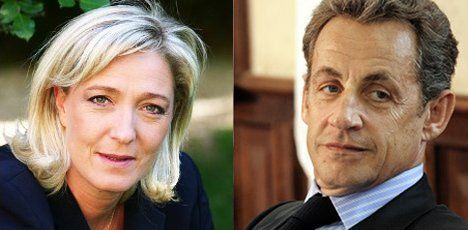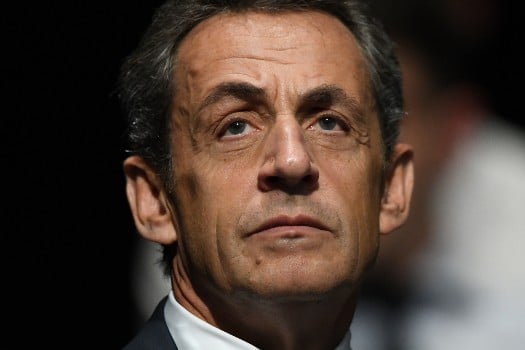The taunt came as Sarkozy and his front-running Socialist rival Francois Hollande prepared to take their duel to the airwaves to sell their competing plans for France if they are elected in the final round on May 6.
Le Pen, who failed to break through to the run-off but got 18 percent, or 6.4 million votes, in Sunday’s first round, said that until a few days ago Sarkozy and his “clique” had attacked her party on all fronts.
“We were xenophobes, anti-Semites, racists, national preference was a terrible shame… and all of a sudden, there is no more of that,” the 43-year-old National Front (FN) leader told RTL radio.
Sarkozy, the first sitting French president to lose a first-round vote, has tilted further to the right since Sunday, vowing to “defend the French way of life”, drastically reduce immigration and secure France’s borders.
Both he and Hollande are battling to woo the millions who plumped for Le Pen and are seen as key to winning the second round, which the latest opinion poll predicted Hollande will take with 54 percent to Sarkozy’s 46 percent.
Sarkozy on Wednesday ruled out any pact with the FN, saying he would give the party no ministerial posts if re-elected, but Hollande still accuses his rival of going too far to woo the extreme right.
The centre-left daily Le Monde agreed with that assessment, writing in a front-page editorial in its edition dated Thursday that since Sunday “the president… has crossed the line between comprehension and compromise”.
It argued that he has “adopted the language, the rhetoric and the ideas – or rather the obsessions – of Ms Le Pen”.
Polls show most far-right supporters prefer Sarkozy, but up to a quarter – mainly working-class voters attracted by Le Pen’s protectionist trade policies – could switch to Hollande.
Le Pen has said she will give her “opinion” on May 1 on whom to back, but analysts say it is unlikely she will endorse either candidate. She is hoping to capitalise on the FN’s strong showing in parliamentary elections in June.
The FN hopes to win its first seats in the national assembly since 1986, when a brief experiment with proportional representation gave it 35 members of parliament.
Millions of French were expected to take to take a ringside seat in their living rooms later Thursday as the candidates are questioned by journalists on the France 2 television channel about their programmes.
The incumbent and his Socialist rival will go head to head next Wednesday in a televised debate, but on Thursday at 1835 GMT they were to appear one after the other in a two-hour show on public television.
Sarkozy was likely to attack his opponent on his immigration policy, tax and plans to hire 60,000 teachers, and could also hit him on his promise to give non-European Union foreigners the right to vote in local elections.
His team returned to familiar attack themes on Thursday, with Foreign Minister Alain Juppé warning that Hollande’s election might deepen Europe’s debt crisis.
Hollande accused Sarkozy of “lies” after the president said the Socialist had received the support of controversial Muslim scholar Tariq Ramadan, and his UMP party said Hollande had the backing of 700 mosques across France.
Ramadan on Thursday denied making any statement to support Hollande, and the French Muslim Council (CFCM) said there had been no call to back him.
Hollande’s campaign gained strength and credibility on Wednesday as the key plank in his economic strategy gathered increasing support in Europe.
His call for the EU fiscal pact to be renegotiated to include ways to boost growth had been derided by Sarkozy as naive and dangerous, and a breach of France’s word to its partners.
But on Wednesday, European Central Bank governor Mario Draghi called for growth initiatives and Germany’s Angela Merkel conceded new measures were needed, although neither shifted in their support for the pact.
Hollande conceded Thursday that his and Draghi’s vision of growth were not quite the same, with the central banker focusing more on “increased competition, deregulation, even privatisation”.
Sarkozy mocked Hollande’s growth plans, arguing sarcastically in a radio interview Thursday that his rival’s plans to create tens of thousands of public sector jobs would do little to boost the economy.



 Please whitelist us to continue reading.
Please whitelist us to continue reading.